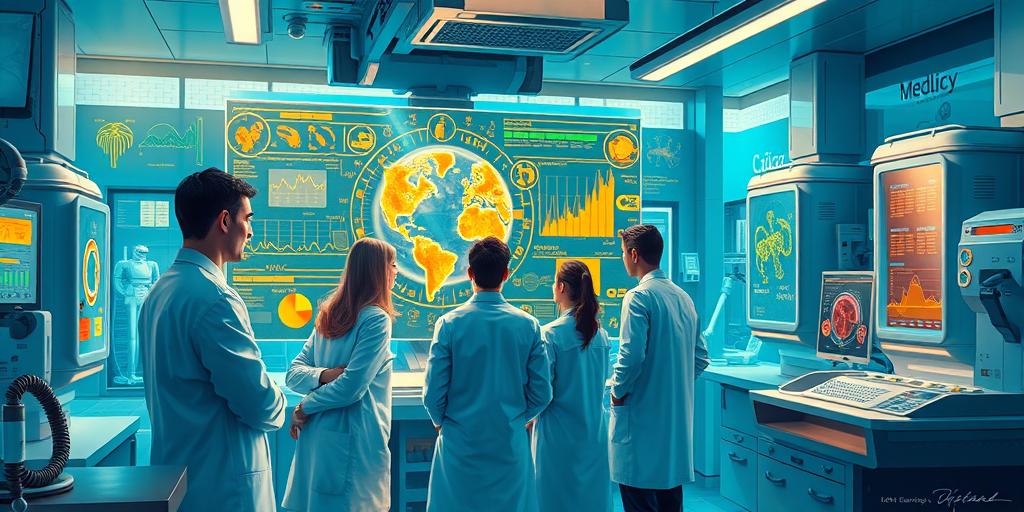Unveiling the Secrets: How Data Science Is Revolutionizing Medical Research
Prepare to be amazed! Data science isn’t just some tech buzzword; it’s the secret weapon quietly revolutionizing medical research. From accelerating drug discovery to personalizing treatments, its impact is undeniable. We’re about to dive into the fascinating world of how data science is transforming healthcare as we know it, uncovering breakthroughs that were once deemed impossible. Get ready to witness the power of data in action!
Accelerating Drug Discovery and Development
The pharmaceutical industry is notoriously slow and expensive. Developing a new drug can take over a decade and cost billions of dollars. Data science is changing this paradigm by streamlining the drug discovery process. By analyzing massive datasets, including genomic data, clinical trial results, and molecular structures, data scientists can identify potential drug candidates far more efficiently than traditional methods. This involves using machine learning algorithms to predict the effectiveness of drugs, identify potential side effects, and optimize drug design. The implications are enormous: faster development, lower costs, and more effective medications reaching patients sooner.
Machine Learning for Drug Target Identification
One critical area where data science excels is in identifying drug targets – the specific molecules or pathways within the body that a drug needs to interact with. Traditional methods of target identification are often time-consuming and inefficient. However, machine learning algorithms can analyze complex biological data to identify promising drug targets with greater speed and accuracy, significantly accelerating the drug discovery process.
Optimizing Clinical Trials
Clinical trials are crucial for evaluating the safety and efficacy of new drugs. Data science significantly improves trial design, patient selection, and data analysis, leading to more efficient and effective trials. Algorithms can predict which patients will respond best to a particular treatment, reducing the time and resources required to conduct the trial.
Personalizing Medicine with Data-Driven Insights
One of the most exciting applications of data science in medicine is the development of personalized medicine. This approach tailors medical treatments to the individual characteristics of a patient, considering factors such as their genetics, lifestyle, and environment. By analyzing patient data, including genomic data, electronic health records, and wearable sensor data, data scientists can develop predictive models that identify which patients are most likely to benefit from a specific treatment and predict the risk of developing certain diseases.
Precision Oncology: A Data-Driven Approach to Cancer Treatment
Cancer treatment is being transformed by data science. Precision oncology uses genomic data to identify specific genetic mutations that drive cancer growth. This information is used to develop targeted therapies that precisely attack cancer cells, minimizing harm to healthy cells. Data scientists play a crucial role in developing algorithms that analyze genomic data and match patients to the most appropriate therapies. This personalized approach is showing tremendous promise in improving cancer treatment outcomes.
Predictive Modeling for Disease Risk
Data science helps identify individuals at high risk of developing certain diseases. By analyzing factors such as family history, genetic predispositions, lifestyle choices, and environmental factors, algorithms can predict the likelihood of developing diseases like heart disease, diabetes, or Alzheimer’s disease. Early detection and preventive measures can significantly improve patient outcomes.
Enhancing Medical Imaging and Diagnostics
Medical imaging plays a vital role in diagnosis and treatment planning. Data science is improving the accuracy and efficiency of image analysis by employing machine learning techniques. Algorithms can detect subtle anomalies in medical images that might be missed by the human eye. This leads to earlier and more accurate diagnosis, ultimately leading to improved treatment outcomes.
AI-Powered Image Analysis for Faster and More Accurate Diagnoses
The use of AI-powered image analysis is rapidly becoming a critical component of medical diagnostics. These algorithms can automatically analyze medical images such as X-rays, CT scans, and MRIs, detecting abnormalities such as tumors, fractures, or other medical conditions, even quicker than human experts.
Improving the Efficiency of Medical Imaging
In addition to enhancing diagnostic accuracy, AI-powered image analysis is also improving the efficiency of medical imaging workflows. These tools can assist radiologists and other specialists in prioritizing cases, expediting the diagnostic process, and ensuring the most urgent cases receive immediate attention.
The Future of Data Science in Medical Research
The applications of data science in medical research are rapidly expanding. As data collection and computing power continue to advance, we can expect to see even more breakthroughs in the years to come. From developing new treatments for diseases to improving the quality of healthcare, data science is playing an increasingly important role in advancing medical research and improving human health. The future of medicine is undoubtedly data-driven, and the possibilities are limitless.
Embrace this revolution. Join us as we unlock the transformative potential of data science in shaping the future of healthcare!




